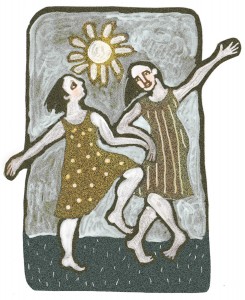Dressing for Justice – by Keith Randall
Spirited Reflection – Sunday, January 26, 2014
Writer-broadcaster Keith Randall is a ruling elder at The Church of St. Andrew and St. Paul, a Presbyterian church in the heart of Montreal.
Write something about justice, they suggested. The KAIROS mission statement calls us to the vision of “God’s compassionate justice.” Compassion’s an emotion, indeed an enviable one, but what exactly is justice? You’d think the Bible would hold a host of definitions but, alas, a concordance search elicits only dry comments such as 1 Chronicles 18:14: “So David reigned over all Israel; and he administered justice and equity to all his people” or Exodus 18:13: “The next day Moses sat as judge for the people, while the people stood around him from morning until evening.” Jesus’ second commandment in Mark 12 has historically been held as the foundation of a Christian concept of justice: “You shall love your neighbour as yourself.” The Canadian Oxford Dictionary succinctly calls it “just conduct; fairness,” and the last refuge of the undereducated, Wikipedia, goes on at some length: “…a concept of moral rightness based [on] ethics, rationality, law, natural law, religion, equity and fairness, as well as the administration of the law, taking into account the inalienable and inborn rights of all human beings and citizens….”
My friend, Rev. Stewart Folster of the Saskatoon Native Circle Ministry, offers another hint by referring me to the four guiding principles or directions of the Medicine Wheel. “The four directions are: faith, honesty, kindness, and caring/sharing. Caring and sharing go together as one direction.”
 Whether your faith lies in the aboriginal Creator, the Judeo-Christian God, Islam’s Allah or the Hindu Brahmin, as Paul assures the Hebrews “faith is the assurance of things hoped for, the conviction of things not seen.” Most of us, I think, can get a grip on faith at least some of the time. Honesty suggests that I should first be honest with myself and, secondly, with all others. This honesty, though, is modified by kindness and the easiest example of that is the old saw about my opinion of my wife’s new dress. Caring and sharing are also sprinkled with kindness – if I care for you my sharing will be generous and care-filled, refraining from over-zealous comments about that new dress until I’m assured of your faith in my judgement of such things. Caring and sharing is clearly a two-way street.
Whether your faith lies in the aboriginal Creator, the Judeo-Christian God, Islam’s Allah or the Hindu Brahmin, as Paul assures the Hebrews “faith is the assurance of things hoped for, the conviction of things not seen.” Most of us, I think, can get a grip on faith at least some of the time. Honesty suggests that I should first be honest with myself and, secondly, with all others. This honesty, though, is modified by kindness and the easiest example of that is the old saw about my opinion of my wife’s new dress. Caring and sharing are also sprinkled with kindness – if I care for you my sharing will be generous and care-filled, refraining from over-zealous comments about that new dress until I’m assured of your faith in my judgement of such things. Caring and sharing is clearly a two-way street.
That sounds like a pretty practical expression of justice for everyday use, but clearly is not going to help us pick sides in the battles raging in the political arena, nor are kindness and caring the first qualities we associate with courts of law. In the former, we see scant evidence that Rev. Folster’s four directions guide politicians, media or the spokespersons for various interests. In the latter, defined by laws forged in the political context, vengeance balanced with the victim’s loss seems to be the intention of courts in the western world, although the introduction of sentencing circles for aboriginal offenders, framed very much by the Medicine Wheel, has met with mixed reviews.
Preaching on the mountain in Matthew 5, Jesus suggests that for justice to fill our world we’re the ones who will have to do the heavy lifting. Armed with a tenuous grasp on my awkward definition of justice, I am charged to be, it seems, “the light of the world. A city built on a hill cannot be hid. No one after lighting a lamp puts it under the bushel basket, but on the lamp stand, and it gives light to all in the house. In the same way, let your light shine before others, so that they may see your good works and give glory to your Father in heaven.”
Oh, boy. That might work with my wife’s new dress, but what about that jerk at work? Is a punch in the nose justice? Or the panhandler on the sidewalk? A loonie or two? Organize a fundraiser for a homeless shelter? The oil – or tar – sands, depending on your point of view? Israel-Palestine? Sudan? Was C.S. Lewis right? “I have received no assurance that anything we can do will eradicate suffering. I think the best results are obtained by people who work quietly away at limited objectives…not by those who think they can achieve universal justice, or health, or peace. I think the art of life consists in tackling each immediate evil as well as we can.”
Nice dress, dear.








